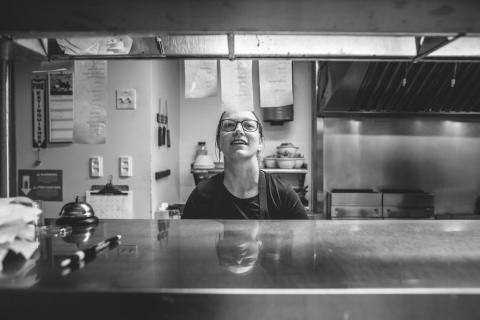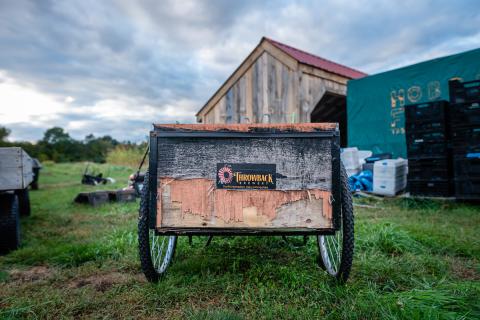Brewing Hops and Hope
This interview is part of the NH Food Alliance’s and Ink + Light Creative’s Field Photos Project, a photo-interview series telling the story of New Hampshire’s vibrant and diverse food system. Explore more from the Field Photos Project here >>
From homebrewing, to selling brews out of a warehouse, to opening a 12-acre working farm, brewery, and restaurant, Nicole Carrier and Annette Lee have made their mark on the Seacoast community with Throwback Brewery. After nearly eleven years of operating in North Hampton as New Hampshire’s only all-women-owned brewery, Throwback Brewery is not slowing down on its vision to brew great beer and support local agriculture.
I spoke with Nicole about her vision for Throwback Brewery to grow through sustainability and community impact. Nicole shared about her values of kindness and hard work, which drives Throwback Brewery’s crew to collaborate as a team. Nicole’s and Annette’s efforts to support local craft beer are grounded by encouraging other women to challenge the male-dominated beer industry and creating a community-oriented and value-driven gathering space for tourists and locals alike.
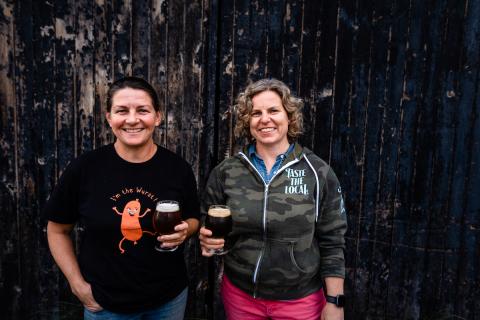
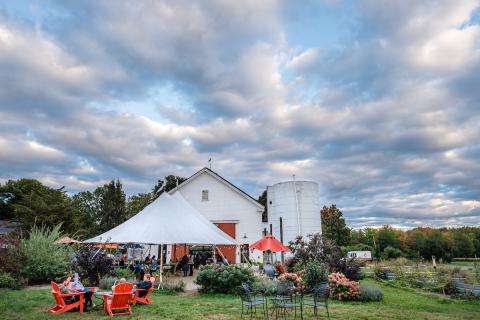
Daisy Young (DY): Tell me a little about how Throwback Brewery began. Where did the motivation for you and Annette to start a locally-focused brewery stem from?
Nicole Carrier (NC): We are pretty unique; we are a farm, a brewery, and a restaurant. We are also one of the first 100% women-owned breweries in the country and still the only 100% women-owned brewery in New Hampshire. We’re the only one that tries to procure most of the grain for our beer from the Northeast Grainshed.
Annette and I started homebrewing around 2000. We fell in love with it for different reasons. I really like to cook and Annette loves science. She’s the engineer half and I’m the MBA half. We are both very much avid farmers’ market-goers and care about where our food comes from. We thought that people would also start to care about where their drink came from. That’s what headed us down the path of trying to create a truly local beer. Not just made locally, but made with as many local ingredients as possible. That’s what got us combining homebrewing with our passion for community and eating local and into what we are today.
We have the same philosophy that we always have had. We started it with a passion to be a throwback to those little breweries pre-prohibition that were community-oriented spaces that only used what was around them. If you look at “throw it back breweries,” they are like taverns, community gathering spaces where people would gather over a pint and have good conversation. We started a little brewery across the street in a warehouse eleven years ago. Then fast forward a year in business, we purchased this great farm we are on right now. We had to rehab it, so on our fourth birthday, we moved into this beautiful space. We try to source as much of our food locally as possible. That’s a lot easier when we have our own farm and are able to grow 50% of what the kitchen needs in the summer. People love to gather here. Tying in notions of the community since day one has always been important to us. And then we have the space to make that a reality.
DY: I love Throwback’s emphasis on community building. Do you offer community events as part of this mission?
NC: We do, yeah! Part of that is it’s just fun to have events. We just hosted a speed-dating style event with the twelve newest brewers and fermenters in the state. Customers would start at one table, talk to the brewers and brewery owners one-on-one for seven minutes, and then they go to the next table. Events like these are meaningful to us because we are able to help our community of brewers, as well as people around us that really want to get together. We also do a lot of philanthropic events here, as well as events like yoga, book club, and cribbage.
DY: Some businesses might think that helping new brewers get started could increase competition. What do you think about that, and why do you think it’s important to uplift other brewers?
NC: They say a rising tide lifts all the boats. Craft is still a small percentage of all the beer sold in the U.S., so we are really all in it together, shoulder to shoulder, fighting to help give craft beer a good name and give us more visibility, and turn people into craft beer lovers. To me, helping others helps us.
For the past five or six years, I’ve helped teach the “Starting a Brewery” class at UNH Professional Development. It’s on the top of my mind because they just asked me to do it again. It could be a karma thing too! I was also the President of the NH Brewers Association for three years, so I’ve definitely spoken to a lot of breweries and given them a lot of advice. It hasn’t hurt us yet and probably has helped us. The other thing is we are a brewpub. There are so many spaces for every town to have its own little gathering space. I think it would be a different story if we were a distributing brewery that needed to own all the shelves everywhere, but we are not.
DY: You just spoke about educating people on brewing. What kind of advice would you give young people who are looking to enter into this line of work?
NC: I say definitely try it out. Get a job in the field, on the ground somewhere, and see if it resonates with you. At the end of the day, you have to be passionate about it because no farmer—except for maybe Elliot Coleman—is making six figures or more a year. It’s a tradeoff. To farm, you really have to love it because it’s hard work. We try to pay as competitively as we can, but no one’s driving Lamborghinis. You are outside, you are eating all kinds of fresh food, and if you really like it, there’s nothing better than growing carrots or potatoes. It’s so satisfying, digging up the potatoes. Trying it out, just to see if it’s something you want to do is the first step. Then, you have to have the passion to have it be a sustainable, long-term career for you.
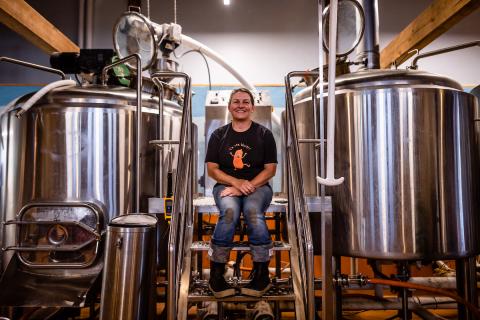

DY: Let’s transition. What are some obstacles your business has faced in light of the COVID-19 pandemic? How has your business adapted to overcome these challenges and what will you carry on as we shift away from the pandemic?
NC: A challenge—we do the vast majority of our business serving people inside and you couldn’t do that anymore. We never did takeout before. We had no systems in place. We were counter service, so people would stand in a big line. We didn’t have table service. That was the beginning. We thought ‘Oh my gosh, 3% of our business is takeout, how do we adapt?’
It started slowly. We had to get all of the systems in place—takeout systems, procedures, how people came and got food. Once things started opening up, we couldn’t have people standing in the line anymore because it was too close. We had to revamp our whole service model to start table service. We weren’t open inside for about a year and we had to figure it out. Once people were starting to come, we revamped our whole beer garden with fire pit rentals. I made bratwurst so people could have campfire weenies. Our chef and team made housemade marshmallows and graham crackers so people could do s’mores outside. And we got an ice skating rink to get people excited about coming over.
There was a silver lining in some aspects to COVID, in that it made us better in different ways. We started canning more, which has been great. We rearranged the front to have a tiny storefront with our house-jarred mustards, jams, merchandise, beer, and sausage on display. I have been making sausage forever and we finally launched our sausage line in October of 2020 called ‘Lady Sausage.’
DY: Tell me about what gets you out of bed in the morning. What motivates you to work, despite these challenges?
NC: When I come into work and the kitchen is all singing a stupid song together on the radio and dancing around, everybody is laughing upfront, joking, and having fun but everybody is working hard—that motivates me. For me, one of the most motivating things is to have an environment where people want to work, where they enjoy coming to work, where it’s rewarding for them, and they get to do their craft. To me, that’s the most rewarding part. We have this environment that we’ve created where everyone cares about each other and we have had great luck with people staying for a while. Our head chef has been with us since we started the restaurant, and we have many team members that have been with us for 5+ years. People just stay and it means the world to us.
There’s a flip side to it as well, which is the customers. We have so many core customers that just love coming back and it feels like we’ve created a family. I know every restaurant feels like that, but it’s true. You have so many regulars that, after a while, seeing them bring their kids and grandkids, the babies that started with us at Throwback are now ten or eleven—it’s insane. That is also extremely rewarding, to see people walk through laughing and enjoying themselves, and having a good time with the people that they love.
DY: Your emphasis on creating an enjoyable environment reminds me of Throwback Brewery’s values. What was the process of developing a value-driven workplace? How did you settle on those values and why do you feel it’s important?
NC: I think that’s the most important thing that we do here and there are a number of reasons why. Annette is a great business partner and we have always had the same set of shared values. We didn’t actually sit down and articulate them until after about four or so years of business. We asked ourselves ‘What are the kind of people that do well here? What is it that we really care about?’
So we used our values for everything, like hiring people. If you don’t care about sustainability, or the environment, if you’re not a team player, you’re not going to do well here. To put it in a more positive way, if you compost at home and recycle, if you work hard and help your teammates, and you’re really nice, you’re going to do well here. Those are the types of people that we want to surround ourselves with.
It also tells our customers who we are, since there are so many choices of who to support. It helps us to have customers that resonate with our values and want to support us because they believe in what we are doing. When I was applying for jobs, no one cared about a company’s values and what they stood for. A lot of the people we hire now—especially the younger folks—care that we are trying to make a difference and want to work in a place where they believe in what that business is trying to do.


DY: At the beginning of this interview, we spoke about Throwback being a women-owned brewery and how special that is. I read that you are a part of the Pink Boots Society and I would love to hear about what it is and what it means to be a part of that.
NC: Pink Boots Society is an organization that’s dedicated to providing education to women in the beer industry. They raise money to give scholarships to people to get trained in all aspects of the beer world and make sure that women are recognized and educated in the industry.
Every year for the past couple of years, there is a Pink Boots blend of hops that one of the hopyards provides. You buy it and the proceeds go back to the Pink Boots. A lot of the breweries around here are doing a trail this year, like we did last year, where everyone is doing some kind of Pink Boots Brew to benefit the Pink Boots Society. This year’s trail will come out in April or May so people can go from brewery to brewery to try all the Pink Boots beers.
In the beer industry, the vast majority are still men, but I think it’s important to have visibility that women can and do brew your beer. I also feel like because it is still such a male-dominated industry—granted it is getting a lot better, with more and more women becoming craft beer aficionados—it helps to encourage women who don’t think they like beer. But then they are excited to try a beer because it’s from a women-owned brewery, and then they’re like ‘Oh, this isn’t that bad!’ or ‘Oh! I really like this!’ Whatever the response is, I’ll take it. But that’s an important aspect as well.
DY: Imagine Throwback Brewery is thriving in ten years. In what ways has your business grown to make a larger impact in the community?
NC: The more we can have this full circle of sustainability, the better. For example, we brew beer, the grain goes to our pigs, the pigs eat the grain, the pigs come back into the restaurant where we make sausage and people eat it. It’s this full circle. The more that we can become more sustainable in that aspect is really important to me. Part of that is for an educational purpose to show people that you can have very low energy usage, you can be a good steward of the environment, and have all of these great things at the same time.
People ask why we have a hopyard if we don’t grow a lot of hops. Well, it’s educational to show people that you can grow hops on the East Coast. This area used to be the number one producer of hops before prohibition and a blight came, moving production to the West coast. I want us to be a must-stop destination in New Hampshire, where it’s more than just beer and sausage. It’s being known for more things, whether we start distilling or making cheese or whatever it is, having a place where you absolutely have to go, it’s an experience that you have to see in New Hampshire. Working on our sustainability, making us one of the most well-known places in New Hampshire for people to have a wonderful experience with their families, that goes back to the community aspect, providing more space for folks in our community to get together and ‘throw one back.’
DY: Your goal of being a must-stop destination in New Hampshire reminds me of the role of breweries within New Hampshire’s food system and agricultural economy. This is shifting—breweries aren’t just brewing beer anymore, they are doing a lot of other things.
NC: There has always been a link. When an off-product of brewing is grain that pigs and cows can eat, it ties breweries into local agriculture. Some of the more food-inspired beers that we have done, like collaborating with chefs, have been pretty cool. Our very first ‘beet beer’ that we brewed used these beautiful heirloom beets grown by Josh from Meadow’s Mirth Farm. People were like ‘Beet beer? I don’t think so!’ But every year people ask for the beet beer, and we make it in bigger batches now. If we didn’t have a brewpub, we probably wouldn’t be able to sell it cause people would think they wouldn't want to drink a beer made using beets. But it’s just beautiful, and when a server walks by with this big, tall glass of fuschia liquid, people are like ‘What is that?’. Customers want to try it, and they usually think it's great!
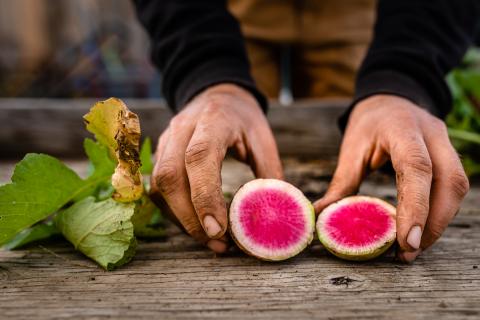
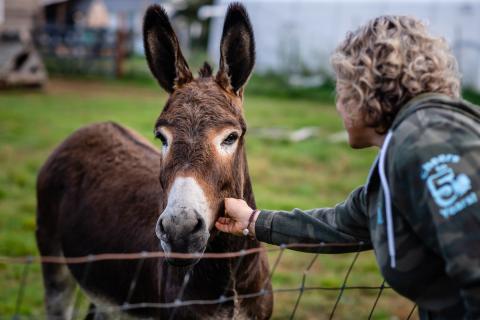
DY: Let’s talk more about Hobb’s Farm, Throwback’s onsite growing operation.
NC: It will be coming up on 10 years since we have purchased the property at auction. It took us three years to get it together, meaning there was a lot of work to be done. On our fourth birthday, we moved in. It was such a big move to go from a 3-barrel system to a 15-barrel system, from no kitchen to opening up a restaurant, that it wasn’t until our fifth birthday that it was time to start farming. We have twelve acres, and about five or six are allocated for farming. Part of that’s our hopyard. We have an orchard, we have two high tunnels that we got a grant to put up, as well as installing drip irrigation. We had a CSA for three years, and this year we are having a flexible CSA. We have a lead farmer and two other full-time farmers, so three full-time farmers basically. That’s one of my favorite parts of the Summer for the business, is to see everything growing here.
My absolute favorite specials at the restaurant are when the farmers come in and say ‘This is what we picked today’ and Chef Carrie and her team whip something up based on what’s been grown. Especially in the Summer, there’s this whole section of the menu from the farm where every special on there was something that was just picked that week.
DY: What is the importance of eating local? What can communities and individuals do to support local food systems?
NC: There are so many ways to answer that. For me, I’m a big taste and eating person. I feel like things made local and fresh just taste better! Outside of all of the environmental reasons, if I’m going to try to convince someone with one reason—it just tastes so much better and so much fresher.
The other thing, that has less to do with sustainability, is jobs. The more that we buy from the local farmers, it keeps them employed, it keeps farmland active in New Hampshire. Who wants to live in this state and have it be all high rises or houses everywhere? If you’re talking about carbon footprint and everything going on with gas prices, there is nothing better than growing carrots, pulling them out, and walking them into the kitchen. There’s no oil involved in that whatsoever. There are so many different reasons why, but those are some of my favorites.
I would also say join a CSA, but that’s not for everyone. Go to your farmers market, at least several times a Summer. Go to all the different booths, try to support a little bit from here and a little bit from there and spread it around. People might be surprised by some of the most amazing food that our farmers grow here and how much better it is than going to the supermarket.
